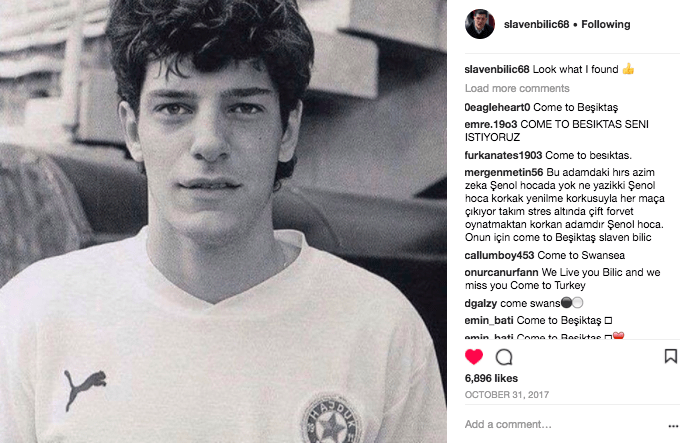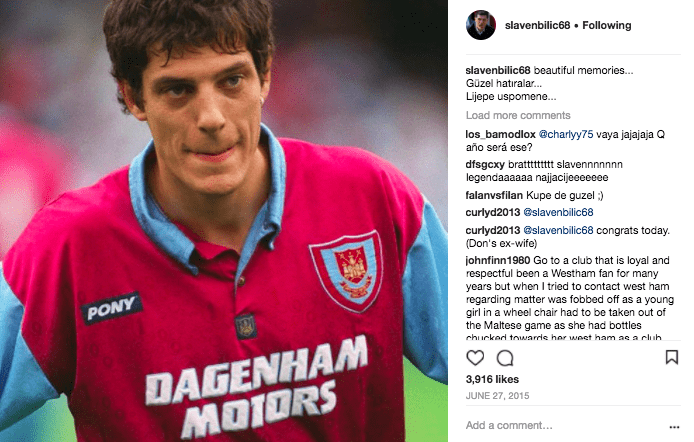Because who wouldn't want to meet Slaven Bilić?
Today we introduce you to a man you may already be familiar with - Slaven Bilić.
The Croatian football star has made his name known from the depths of Croatia to the bench of a famous Premier League side, and today, we’ll help you understand how his name is among one of the most popular Croatian signatures to date.
Slaven Bilić was born in Split, Croatia on September 11, 1968, as the second child of his parents. Growing up, Slaven lived with his family in the same building as famous basketball player Toni Kukoč. Because Kukoč was born just one week after Slaven, and at the same hospital, the two of them often socialized and played together during their young years. Since Slaven’s parents were employed, he was mostly raised by his grandmother on his mother's side.
As a child of about four years, Bilić suddenly stopped talking - and for reasons unknown. The doctors assumed he suffered a trauma that might have happened to him most likely in his sleep, but his parents linked the problem to the state of affairs in the family at the time. Slaven's father had become the center of threats after he had enrolled in Matica Hrvatska in Yugoslavia, for which, with condemnation, his fellow citizens called him an Ustaša. Slaven eventually did speak but says he developed a voice that still sometimes faults him today. Bilić, therefore, participates in actions that help children with speech problems and has become an honorary member of the association "Hinko Freund", the Croatian organization to help people that stutter.
A brilliant young student who excelled especially in math and history, Slaven studied at the Economics school in Split with many other students who belonged to the Hajduk juniors program. A footballer from a young age and someone who knew he wanted to be a professional footballer when he grew up, Slaven’s parents ensured that his studies always came first. Using his excellent grades as motivation to continue his football career, Slaven graduated high school with honors in information, journalism and documentary studies, and later went on to study law at the University of Split where his father was the dean. Slaven holds a law degree today.
As a child, Bilić first started as a swimmer, and despite having finished third place in Dalmatia for swimming as a primary schoolboy, he was always more attracted to playing football. Though he was a good player, due to the political opportunities and the Ustasha label he wore from his father, he did not get the chance to play at better clubs or Yugoslavia's national team right away. He played six seasons at Hajduk, and then went on to play for foreign clubs.
Slaven began his youth football career at beloved Split club Hajduk in 1977, pushed to do so by his best friend, Ivo Cuzzi, who is one of the most talented footballers of his generation. It wasn’t until 1988 that Slaven was called up to Hajduk’s A-team, and at the club through 1993, Slaven was sent on loan to Primorac and Šibenik. An avid goal scorer from his center-half position, Slaven went on to win the Yugoslav Cup, the Super Cup, and the Croatian Cup with Hajduk.

Making his name known from an early age, Slaven became eye-candy for bigger clubs, and most notably West Ham United. While the Croat moved from Hajduk to Karlsruher SC in 1993, in January 1996, West Ham manager Harry Redknapp brought the Croat over to the Premier League side for EUR 1.3 million - a record fee for an incoming player. Slaven stayed at West Ham through 1997, playing 54 games for the London club and was even voted runner-up for the 'Hammer of the Year' Award.
From West Ham, Slaven moved to Everton - though he missed many games due to bookings that called for suspensions.

While Bilić made his debut for the national team in 1992, it was 1998 that we all remember the most. In 1998, Slaven was part of the most famous Croatian national football team which won the bronze medal in the World Cup in France. Unfortunately, after the tournament, Slaven suffered a brutal groin injury which didn’t allow him to return to top physical form.
The injury, at the very least, prompted Slaven to return to his beloved club Hajduk Split in 1999 where he stayed until he retired from his football career.
Though no longer a player, Slaven tried his hand at managing. Starting his new career as the coach of Hajduk in 2001, Slaven was warmly welcomed by fans - and he even took the club to second place in the Croatian First League! Slaven then went on to coach Croatia’s U-21 team, and later was handed a dream job - the coach of the Croatian national team, in 2006. His assistants included former teammates Aljoša Asanović, Robert Prosinečki, Nikola Jurčević, and Marijan Mrmić. Slaven is also known for bringing up some pretty prominent players from the U-21 team including Eduardo, Luka Modrić, and Vedran Ćorluka. You might know them.
Bilić took Croatia to the Euro 2008 competition as the youngest coach, winning all games of the group stage in the tournament. Croatia was known as the favorites of the competition, but was unfortunately removed in the quarterfinals to Turkey. Slaven said the game will haunt him for the rest of his life. After Croatia’s Euro 2012 performance, Slaven left the bench of the national team as one of the most highly praised coaches to date.
Slaven then went on to manage Lokomotiv Moscow, Besiktas, and most famously West Ham United which he was released from in 2017.
Bilić married future lawyer Adrijana in 1993, with whom he has two children. After 14 years of marriage, the two mutually divorced, and one year later, Bilić presented his new girlfriend, Ivana Đeldum, a travel manager from Rijeka, who was 15 younger than the footballer. In 2014, the couple had their first child, Sofia, and in 2016 their second daughter Nia was born.
Bilić is known for his humanitarian work, and in 2008, he became UNICEF's ambassador of goodwill and founded the HNR "Vatreno srce" Foundation which provides humanitarian aid to children.
Bilić is also known for his love of music. He even once said that he is the only player on the national team who plays rock albums instead of folk music. Bilić plays the guitar and has been a member of two bands, 'Newer' and popular 'Rawbau' whose hits also reached the Croatian music charts.
Source: Biografija

